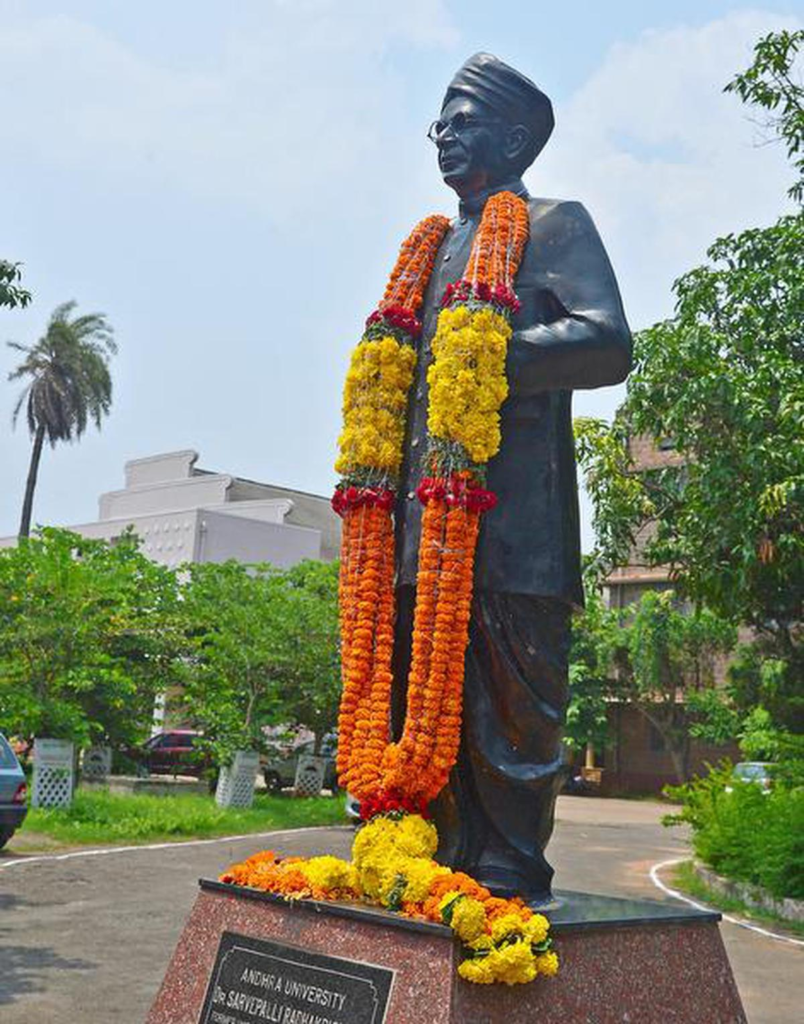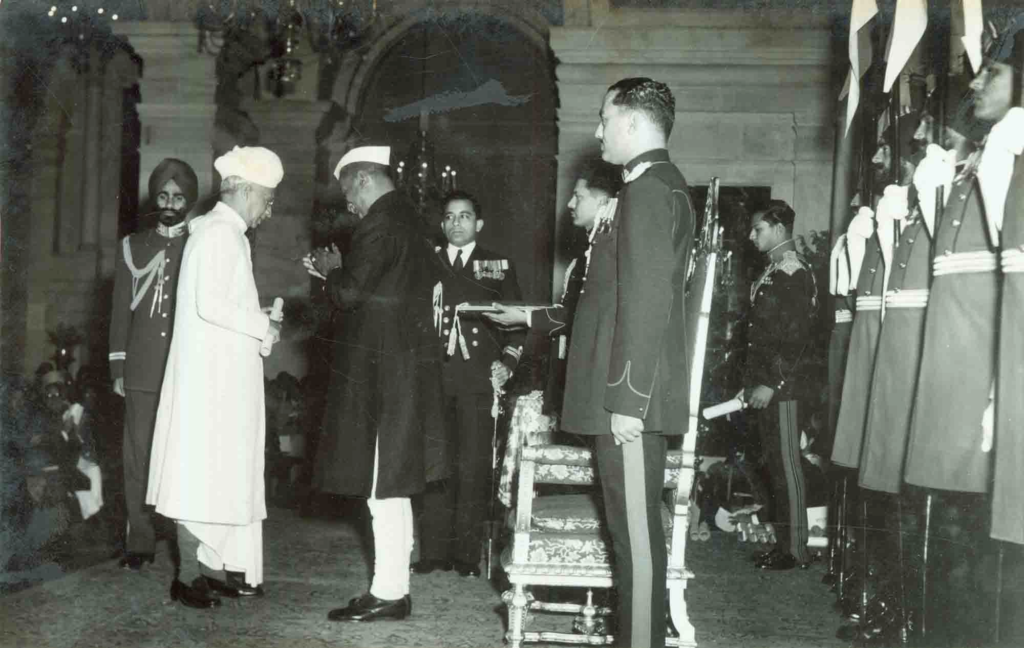Sarvepalli Radhakrishnan (1888-1975) was a distinguished Indian philosopher, academic, and statesman, celebrated for his deep understanding of Indian philosophy and his efforts to bridge Eastern and Western thought. Born on September 5, 1888, in a small village near Tiruttani, Tamil Nadu, Radhakrishnan’s intellectual journey began in his early years, marked by an exceptional academic prowess.
Sarvepalli Radhakrishnan completed his education at Madras Christian College, where he focused on philosophy. His insightful thesis on Vedanta ethics and metaphysics earned him recognition and laid the groundwork for his future work. His academic career took off as he held professorships at Mysore University and Calcutta University, significantly influencing the study of Indian philosophy and religion.
Sarvepalli Radhakrishnan (topicsxpress.com)
In 1931, Sarvepalli Radhakrishnan became the Vice-Chancellor of Andhra University, where he played a key role in enhancing higher education in India. His expertise was further recognized when he was appointed Spalding Professor of Eastern Religions and Ethics at the University of Oxford in 1936. During his tenure at Oxford, he became a leading figure in introducing Indian philosophical ideas to the Western world.
Sarvepalli Radhakrishnan philosophical work was pivotal in interpreting and defending Hinduism, particularly Vedanta, against Western critiques. He authored several influential books, including “The Philosophy of Rabindranath Tagore”, “Indian Philosophy”, and “The Principal Upanishads”. These writings showcased his ability to blend traditional Indian thought with contemporary philosophical perspectives, making Indian philosophy accessible and relevant to a global audience.
Transitioning from academia to public service, Radhakrishnan’s commitment to India’s independence and progress was evident. He served as India’s Ambassador to the Soviet Union from 1949 to 1952, where he strengthened Indo-Soviet relations during a tense period in the Cold War. His diplomatic skills and vision for international cooperation were highly valued.
Sarvepalli Radhakrishnan political career reached its zenith when he was appointed Vice-President of India in 1952. As the first Vice-President, he presided over the Rajya Sabha with great dignity. In 1962, he became the second President of India. His presidency was marked by his advocacy for education, democracy, and moral values. His tenure was a period of significant nation-building, and he earned respect for his ethical leadership and intellectual contributions.
In recognition of his contributions to education and philosophy, Radhakrishnan was honored with several awards, including the Bharat Ratna in 1954, India’s highest civilian award, and the Templeton Prize in 1975, awarded posthumously. His legacy extends beyond his academic and political achievements; his birthday, September 5, is celebrated as Teachers’ Day in India, honoring his impact on education and his role as a revered educator.

Sarvepalli Radhakrishnan’s life was a testament to the power of intellectual and ethical leadership. His efforts to harmonize Eastern and Western philosophies, his dedication to education, and his role in shaping modern India continue to inspire and influence generations. His contributions to philosophy and education have left an indelible mark on India and the world.
Early Life and Education
Sarvepalli Radhakrishnan, originally named Sarvepalli Radhakrishnayya, was born on September 5, 1888, into a Telugu Niyogi Brahmin family in Tiruttani, Tamil Nadu. He was the fourth of six children, with five brothers and one sister. His father, Sarvepalli Veeraswami, worked as a subordinate revenue official for a local landlord. Radhakrishnan’s early years were spent in Tiruttani and Tirupati, where his father’s modest position meant that the family faced financial constraints.
Sarvepalli Radhakrishnan educational journey began at K. V. High School in Tiruttani. In 1896, he moved to the Hermansburg Evangelical Lutheran Mission School in Tirupati and later attended the Government High Secondary School in Walajapet. Despite the challenges, his intellectual curiosity shone through, leading him to further his studies at Voorhees College in Vellore. Here, he continued his education before joining Madras Christian College at the age of 16. He graduated from this college in 1907 and pursued his Master’s degree there as well.
Radhakrishnan’s interest in philosophy was somewhat serendipitous. Although he initially wished to study mathematics, financial constraints led him to take up philosophy after receiving his cousin’s textbooks. His bachelor’s thesis, titled “The Ethics of the Vedanta and its Metaphysical Presuppositions,” addressed criticisms that the Vedanta philosophy lacked ethical considerations. The thesis received praise from his professors, Rev. William Meston and Dr. Alfred George Hogg, and was published when Radhakrishnan was just twenty years old.
Radhakrishnan’s academic journey was influenced by the criticism he faced from some Christian scholars regarding Indian culture. This criticism spurred him to delve deeper into Hinduism and defend it against what he considered uninformed Western critiques. Despite the challenges, Radhakrishnan held a deep respect for his critics, particularly Professor Hogg, and valued their contributions to his own intellectual development.
Education
Throughout his academic career, Sarvepalli Radhakrishnan received numerous scholarships, reflecting his exceptional academic abilities. After completing his schooling, he enrolled at Voorhees College in Vellore for his higher secondary education. Following this, he joined Madras Christian College, affiliated with the University of Madras, at the young age of 16. Radhakrishnan graduated in 1907 and continued his studies at the same institution, completing his Master’s degree with distinction.
Radhakrishnan’s decision to study philosophy was somewhat incidental. Initially inclined towards mathematics, he was guided towards philosophy due to financial constraints and the availability of his cousin’s textbooks on the subject. His undergraduate thesis, which focused on the ethical dimensions of Vedanta philosophy, garnered significant attention and praise from his professors. This work was particularly noted for addressing the claim that Vedanta lacked ethical substance.
The feedback and criticism he received from some Christian scholars about Indian philosophy deeply affected Radhakrishnan. It prompted him to undertake a critical study of Hinduism and defend it against what he perceived as biased Western criticism. Radhakrishnan’s engagement with these challenges not only solidified his commitment to Hindu philosophy but also enhanced his reputation as a scholar. His academic achievements and the testimonials from his professors, including Professor William Skinner, paved the way for his first academic position at Presidency College.
The Spirit of Abheda
In his work The Ethics of the Vedanta, Sarvepalli Radhakrishnan expressed his frustration with Western critics who dismissed Vedanta as lacking ethical depth. He argued that the Vedanta philosophy is deeply ethical, contrary to popular belief. Radhakrishnan cited Max Muller, a German-born philologist and Orientalist, who acknowledged the ethical richness of Vedanta, emphasizing that ethics pervades the philosophy from start to finish.
Radhakrishnan introduced the concept of “The Spirit of Abheda,” or non-difference, which is central to Vedanta. This principle advocates viewing all creation as interconnected and equal. According to Radhakrishnan, this perspective naturally leads to an ethics grounded in love and brotherhood. He emphasized that every individual should be regarded as an equal and treated with dignity, not merely as a means to an end.
In essence, Radhakrishnan’s exploration of Vedanta was not just an academic endeavor but a profound engagement with the ethical implications of Hindu philosophy. His work aimed to demonstrate that Vedanta’s teachings on unity and equality are deeply relevant and offer a meaningful framework for understanding human dignity and respect.
Personal Life
Sarvepalli Radhakrishnan married Sivakamu, a distant cousin, in May 1903 when he was just 16 years old and she was 10. Their marriage, arranged by their families according to tradition, marked the beginning of a lifelong partnership. They had five daughters—Padmavati, Rukmini, Sushila, Sundari, and Shakuntala—and a son named Sarvepalli Gopal, who went on to become a notable historian. Sivakamu passed away on November 26, 1956, after a marriage lasting 53 years.

Sarvepalli Radhakrishnan family continued his legacy in various fields. His descendants have pursued careers in academia, public policy, medicine, law, banking, business, and publishing, both in India and abroad. Among his extended family is VVS Laxman, a former Indian cricketer and director of the National Cricket Academy, who is Radhakrishnan’s great grandnephew. Despite his towering public persona, Radhakrishnan maintained a private life dedicated to his family, supporting his children and grandchildren as they embarked on their professional journeys.
Academic Career
Sarvepalli Radhakrishnan academic career began in April 1909 when he joined the Department of Philosophy at Madras Presidency College. By 1918, he had advanced to a position as Professor of Philosophy at the University of Mysore, teaching at Maharaja’s College. During this time, he wrote extensively for prestigious journals and completed his first book, The Philosophy of Rabindranath Tagore. Radhakrishnan saw Tagore’s philosophy as a genuine reflection of the Indian spirit. His second book, The Reign of Religion in Contemporary Philosophy, was published in 1920.

President John F. Kennedy in the Oval Office, 1963.
In 1921, Sarvepalli Radhakrishnan was appointed to the King George V Chair of Mental and Moral Science at the University of Calcutta. His academic influence grew as he represented Calcutta University at the Congress of the Universities of the British Empire in 1926 and the International Congress of Philosophy at Harvard later that year. Notably, he delivered the Hibbert Lecture at Manchester College, Oxford, in 1929, which was later published as An Idealist View of Life.
Sarvepalli Radhakrishnan role at Manchester College included lecturing on Comparative Religion at the University of Oxford. His contributions to education were recognized with a knighthood by George V in 1931, although he chose not to use the title after Indian independence. Instead, he preferred the academic title of ‘Doctor.’ His tenure as Vice-Chancellor of Andhra University from 1931 to 1936 highlighted his vision for education and regional unity. Radhakrishnan’s leadership extended to Banaras Hindu University, where he served as Vice-Chancellor until early 1948. His academic journey is marked by his dedication to philosophy and education, which set the stage for his future roles in public service.
Political Career
Sarvepalli Radhakrishnan entered politics later in life, following a distinguished academic career. His international reputation as a scholar preceded his political involvement. In 1928, he supported the renaming of the Ceded Districts division of Madras Presidency to Rayalaseema at the Andhra Mahasabha. His nomination to the League of Nations Committee for Intellectual Cooperation in 1931 further established his role as a leading interpreter of Indian ideas on the global stage.

Sarvepalli Radhakrishnan of India (on the left) leave the White House after their meeting.
Behind President Kennedy, at the West Wing Entrance of the White House in Washington, D.C.,
walks India’s Minister of External Affairs, Lakshmi N. Menon.
With India’s independence in 1947, Sarvepalli Radhakrishnan political career took off. He represented India at UNESCO from 1946 to 1952 and served as the Indian Ambassador to the Soviet Union during the same period. His roles also included being a member of the Constituent Assembly of India. Elected as India’s first Vice-President in 1952, he later became the second President of India from 1962 to 1967.
Although he did not have a background in the Congress Party or active involvement in the independence movement, Radhakrishnan was driven by a deep pride in Hindu culture and a commitment to defending it against Western misconceptions. Historian Donald Mackenzie Brown notes that Sarvepalli Radhakrishnan symbolized Indian intellectual pride and worked to counter uninformed Western criticism of Hinduism.
Teacher’s Day
When Sarvepalli Radhakrishnan assumed the role of President of India, his students and friends suggested celebrating his birthday, September 5th. However, Sarvepalli Radhakrishnan expressed a preference for honoring the day as Teachers’ Day instead. He stated:
“Instead of celebrating my birthday, it would be my proud privilege if September 5th is observed as Teachers’ Day.”
His request was honored, and since then, September 5th has been celebrated as Teachers’ Day in India, a tribute to educators and their contributions to society. This day recognizes the vital role teachers play in shaping the future and reflects Sarvepalli Radhakrishnan deep respect for the teaching profession.
Charity
In the pre-independence era, Radhakrishnan, alongside prominent social worker G. D. Birla and other philanthropists, established the Krishnarpan Charity Trust. This organization was focused on providing aid and support to those in need, embodying Radhakrishnan’s commitment to social welfare and community service.
Role in Constituent Assembly
As a member of the Constituent Assembly, Radhakrishnan was a strong advocate for secularism in education. He opposed state institutions providing religious instruction, emphasizing that such practices were inconsistent with the secular principles of the Indian state. His stance reflected his belief in a separation between religion and state affairs, contributing to the foundation of a secular educational framework in India.

including trips to both the United States and the Soviet Union.
Global Policy
Sarvepalli Radhakrishnan played a significant role in global diplomacy and policy. Alongside Albert Einstein, he was a sponsor of the Peoples’ World Convention (PWC), also known as the Peoples’ World Constituent Assembly (PWCA), held in 1950-51 in Geneva, Switzerland. This assembly aimed to address global issues and promote international cooperation, reflecting Radhakrishnan’s commitment to global peace and collaboration.
Philosophy
Sarvepalli Radhakrishnan philosophical work sought to bridge Eastern and Western thought. He defended Hinduism against what he perceived as uninformed Western criticism, while also integrating Western philosophical ideas into his own understanding. His approach was marked by an attempt to harmonize traditional Indian philosophy with contemporary Western thought, making his work relevant to a global audience.
Advaita Vedanta
Sarvepalli Radhakrishnan was a leading proponent of Neo-Vedanta, a modern interpretation of Advaita Vedanta. While grounded in the traditional non-dualistic philosophy of Advaita, he adapted it to address contemporary issues. Radhakrishnan acknowledged the reality and diversity of the world of experience, which he viewed as grounded in the absolute reality, or Brahman. He also offered a revised interpretation of Shankara’s concept of maya, viewing it not as absolute idealism but as a subjective misperception of the world’s ultimate reality.
Intuition and Religious Experience
Central to Sarvepalli Radhakrishnan philosophy was the concept of intuition, which he regarded as a significant source of knowledge, distinct from rational thought. Influenced by thinkers like William James, F. H. Bradley, Henri Bergson, and Friedrich von Hügel, as well as Swami Vivekananda, Radhakrishnan emphasized intuition’s role in understanding and experiencing reality. In his work An Idealist View of Life, he argued that intuition is self-certifying, self-evident, and self-luminous, offering insights beyond intellectual reasoning. Radhakrishnan’s focus on intuitive experience underscored his belief in its importance for a comprehensive understanding of life and knowledge.
Radhakrishnan’s Classification of Experience and Religions
Types of Experience
Sarvepalli Radhakrishnan distinguished eight kinds of experience, reflecting his broad understanding of human perception and cognition:
- Cognitive Experience: This includes sense experience, which involves acquiring knowledge through the senses, and discursive reasoning, which refers to the logical and analytical processes of thought.
- Intuitive Apprehension: This type of experience involves immediate understanding or insight without the need for conscious reasoning.
- Psychic Experience: Experiences related to the mind and emotions, often encompassing psychological and mystical phenomena.
- Aesthetic Experience: This pertains to experiences related to beauty and artistic appreciation.
- Ethical Experience: This involves the moral and ethical dimensions of experience, related to principles of right and wrong.
- Religious Experience: This is a deeply personal experience related to the divine or sacred.
Classification of Religions
Sarvepalli Radhakrishnan categorized religions based on their approach to and understanding of religious experience. He viewed theology and religious creeds as intellectual formulations and symbols of deeper religious intuitions. His hierarchical classification was as follows:
- The Worshippers of the Absolute: At the highest level, those who seek and worship the absolute reality, or Brahman.
- The Worshippers of the Personal God: Individuals who worship a personal deity with specific attributes and characteristics.
- The Worshippers of Incarnations: Those who revere divine incarnations such as Rama, Krishna, or Buddha.
- The Worshippers of Ancestors, Deities, and Sages: This group includes those who honor ancestors, deities, and wise sages.
- The Worshippers of Petty Forces and Spirits: Individuals who venerate lesser spirits and forces.
Sarvepalli Radhakrishnan perceived Hinduism as a scientific religion grounded in intuition and religious experience. He argued that if the philosophy of religion were to be truly scientific, it must be empirical and based on direct religious experience. He saw this empiricism reflected in the Vedas, which he considered the highest authority due to their basis in spiritual intuition rather than mere logical reasoning. The Vedic seers, or ṛṣis, were regarded as pioneers who discerned eternal truths through spiritual vision rather than transient perceptions.
In his writings, particularly in The Hindu View of Life, Radhakrishnan elaborated on his hierarchical view of religious practices. He suggested that the most advanced spiritual individuals perceive the divine in their own deeper selves, while those at lower levels of spiritual development find the divine in external symbols and rituals. According to him, the most profound understanding of God is found within oneself, beyond physical representations and superficial practices.
Sarvepalli Radhakrishnan championed Advaita Vedanta as the pinnacle of Hindu philosophy due to its emphasis on intuitive understanding and its resistance to mere intellectual mediation. He defended Vedanta against criticisms of “quietism” and “world denial,” arguing that it promotes active social service and a modern interpretation of classical concepts like tat-tvam-asi (that thou art). For Radhakrishnan, Vedanta represented the essence of religion in its most universal and profound sense.
Although Radhakrishnan respected Western philosophy, he criticized it for being influenced by the theological biases of Western culture. He believed that even the most objective Western philosophers were shaped by their own cultural and religious contexts, which impacted their philosophical perspectives
Influence and Criticism of Sarvepalli Radhakrishnan

Influence
Global Impact: Sarvepalli Radhakrishnan’s scholarship has had a profound influence on both Indian and Western perspectives on philosophy and religion. His defense of Hindu traditions and interpretations of Vedanta contributed significantly to:
- Formation of India as a Nation-State: Radhakrishnan’s ideas played a role in shaping India’s national identity and cultural heritage, reinforcing the centrality of Vedanta in understanding Hinduism.
- Hinduism’s Global Appeal: By making Hinduism more accessible to a Western audience through his emphasis on “spiritual experience,” Radhakrishnan helped popularize Indian spiritual traditions in the West. His work, along with figures like Vivekananda, facilitated the introduction of Vedanta to European and American audiences, nourishing their spiritual quests in the early 20th century.
Academic and Public Appraisal: Radhakrishnan was recognized for his ability to bridge Eastern and Western thought. As Paul Artur Schillp noted, Radhakrishnan exemplified a living “bridge” between these two worlds, deeply rooted in Indian traditions while also engaging extensively with Western philosophy. Hawley also highlighted Radhakrishnan’s role as a bridge-builder and his influence in shaping Western understanding of Hinduism and India.
Criticism
Perennialism and Universalism: Radhakrishnan’s perennialist and universalist claims have faced criticism:
- Perennialism: Sarvepalli Radhakrishnan idea of an underlying “divine unity” and essential commonality among philosophical and religious traditions has been critiqued for its essentialism. Critics argue that this approach overlooks the cultural and historical contexts that shape religious experiences and traditions. Scholars like Michaels and Rinehart suggest that religions are more accurately understood through their behavioral patterns and historical contexts rather than through universal claims of shared truths.
- Universalism and Hindu Nationalism: Radhakrishnan’s elevation of Vedanta as the core of Hinduism has been seen as serving Hindu nationalist agendas. Critics argue that this perspective has been used to construct a nationalist ideology that unifies Hindus against colonial oppression. Some scholars, including Sucheta Mazumdar and Vasant Kaiwar, point out that such universalist claims can reinforce communalism and create a framework that subsumes diverse religious differences under a single Vedantic truth.
Post-Colonial Critique: Sarvepalli Radhakrishnan work reflects colonial influences, particularly in his dichotomy between the spiritual East and the rationalist West. Hawley argues that these characterizations are “imagined” constructs rather than accurate representations of either East or West. Since the 1990s, scholars have debated the colonial impact on the representation of Hinduism and sought to develop more nuanced and informed understandings that are rooted in Indian traditions rather than Western frameworks.
Feud with The Modern Review: Sarvepalli Radhakrishnan appointment to a prominent chair of philosophy in India led to criticism from Bengali intellectuals and The Modern Review. The review questioned his use of sources and accused him of plagiarism, specifically in relation to his book Indian Philosophy. Radhakrishnan defended himself by arguing that similarities in translations were due to standard practices and that his book was completed before the publication of the disputed thesis. The dispute escalated into legal battles, which were eventually settled with the withdrawal of all allegations.
Awards and Honors of Sarvepalli Radhakrishnan
State Honors
- Knight Bachelor (British India, 1931): Radhakrishnan was knighted by the British Empire but ceased to use the title “Sir” after India’s independence in 1947.
- Bharat Ratna (India, 1954): The highest civilian honor in India, awarded for exceptional service to the nation.
- Order of the Aztec Eagle (Mexico, 1954): The highest civilian honor of Mexico, awarded in recognition of his contributions to the cultural and intellectual exchange between India and Mexico.
- Pour le Mérite (Germany, 1954): Awarded for Sciences and Arts, one of Germany’s highest honors.
- Order of Merit (United Kingdom, 1963): Honorary membership, recognizing his contributions to philosophy and global understanding.

award from President Rajendra Prasad.
Other Achievements
- 1938: Elected Fellow of the British Academy.
- 1947: Elected as a Permanent Member of the Institut International de Philosophie.
- 1959: Awarded the Goethe Plaque by the City of Frankfurt.
- 1961: Received the Peace Prize of the German Book Trade.
- 1962: Teacher’s Day was instituted in India on September 5, Radhakrishnan’s birthday, honoring his belief in the importance of teachers.
- 1968: Received the Sahitya Akademi Fellowship, the highest honor given by the Sahitya Akademi (India’s National Academy of Letters). He was the first to receive this award.
- 1975: Awarded the Templeton Prize for advocating non-aggression and a universal reality of God. He donated the prize money to Oxford University.
- 1989: Oxford University established the Radhakrishnan Scholarships, later renamed the “Radhakrishnan Chevening Scholarships,” in his memory.
Nominations:
- Nominated sixteen times for the Nobel Prize in Literature.
- Nominated eleven times for the Nobel Peace Prize.
Commemorative Stamps
- 1967: Stamps issued in India Post to honor Sarvepalli Radhakrishnan.
- 1989: Additional commemorative stamps released.
In Popular Culture
- Sarvepalli Radhakrishna (1988): A documentary film about Sarvepalli Radhakrishnan, directed by N. S. Thapa and produced by the Government of India’s Films Division.
Notable Quotes
- “It is not God that is worshipped but the authority that claims to speak in His name. Sin becomes disobedience to authority not violation of integrity.”
- “Reading a book gives us the habit of solitary reflection and true enjoyment.”
- “When we think we know, we cease to learn.”
- “A literary genius, it is said, resembles all, though no one resembles him.”
- “There is nothing wonderful in my saying that Jainism was in existence long before the Vedas were composed.”
- “A life of joy and happiness is possible only on the basis of knowledge.”
- “If he does not fight, it is not because he rejects all fighting as futile, but because he has finished his fights. He has overcome all dissensions between himself and the world and is now at rest… We shall have wars and soldiers so long as the brute in us is untamed.”
Sarvepalli Radhakrishnan contributions have been widely recognized and celebrated both in India and internationally, reflecting his significant impact on philosophy, education, and intercultural dialogue.




